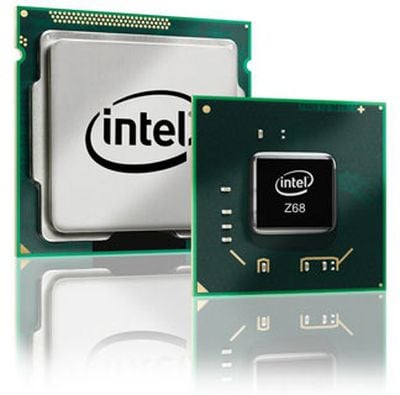Apple Gains Early Access to Intel's Z68 Chipset for New iMacs
As
noted by tonymacx86 (
via 9 to 5 Mac), iFixit's
teardown of the new iMac released earlier this week reveals that the machine utilizes Intel's BD82Z68 platform controller. The inclusion is notable in part because the Z68 chipset is reportedly not set for public introduction until
next week.
Apple use of the Z68 chipset marks yet another exclusive for the company, which has occasionally been granted early access to forthcoming chip components ahead of public unveilings and competitors' offerings.
The Z68 chipset is also notable because it supports SSD caching, a system that marries conventional hard drives to small solid-state drives (SSDs) to provide a seamless user experience with increased performance as the most frequently-accessed files are placed on the speedy SSD.
Apple of course offers SSD options in its iMacs, either as a replacement for or in addition to the traditional hard drive included as standard. The iMac's SSD, however, is a full 256 GB drive rather than the much smaller-capacity drives envisioned for SSD caching. And while Apple doesn't seem to be supporting true SSD caching in the new iMacs, the company achieves a similar but less seamless effect by installing the operating system and applications on the SSD while leaving the traditional hard drive for media on systems configured with both types of drives.
Intel is reportedly preparing to launch its own "Larsen Creek" line of SSDs with capacities around 20 GB and specifically designed to support seamless SSD caching when paired with a traditional hard drive and a compatible chipset such as the Z68. It is unclear if Apple will be looking to incorporate such systems in future hardware, but the company is clearly interested in pursing SSD technology for its performance benefits.
Popular Stories
Apple today shared an ad that shows how the upgraded Center Stage front camera on the latest iPhones improves the process of taking a group selfie.
"Watch how the new front facing camera on iPhone 17 Pro takes group selfies that automatically expand and rotate as more people come into frame," says Apple. While the ad is focused on the iPhone 17 Pro and iPhone 17 Pro Max, the regular iPhone...
In select U.S. states, residents can add their driver's license or state ID to the Apple Wallet app on the iPhone and Apple Watch, and then use it to display proof of identity or age at select airports and businesses, and in select apps.
The feature is currently available in 13 U.S. states and Puerto Rico, and it is expected to launch in at least seven more in the future.
To set up the...
Apple is planning to launch new MacBook Pro models as soon as early March, but if you can, this is one generation you should skip because there's something much better in the works.
We're waiting on 14-inch and 16-inch MacBook Pro models with M5 Pro and M5 Max chips, with few changes other than the processor upgrade. There won't be any tweaks to the design or the display, but later this...
Wednesday February 11, 2026 10:07 am PST by
Juli CloverApple today released iOS 26.3 and iPadOS 26.3, the latest updates to the iOS 26 and iPadOS 26 operating systems that came out in September. The new software comes almost two months after Apple released iOS 26.2 and iPadOS 26.2.
The new software can be downloaded on eligible iPhones and iPads over-the-air by going to Settings > General > Software Update.
According to Apple's release notes, ...
It has been a slow start to 2026 for Apple product launches, with only a new AirTag and a special Apple Watch band released so far. We are still waiting for MacBook Pro models with M5 Pro and M5 Max chips, the iPhone 17e, a lower-cost MacBook with an iPhone chip, long-rumored updates to the Apple TV and HomePod mini, and much more.
Apple is expected to release/update the following products...




















